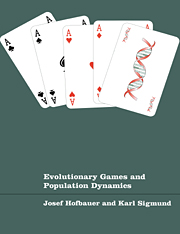Book contents
- Frontmatter
- Contents
- Preface
- Introduction for game theorists
- Introduction for biologists
- About this book
- Part one Dynamical Systems and Lotka–Volterra Equations
- Part two Game Dynamics and Replicator Equations
- Part three Permanence and Stability
- Part four Population Genetics and Game Dynamics
- 18 Discrete dynamical systems in population genetics
- 19 Continuous selection dynamics
- 20 Mutation and recombination
- 21 Fertility selection
- 22 Game dynamics for Mendelian populations
- References
- Index
21 - Fertility selection
Published online by Cambridge University Press: 05 June 2012
- Frontmatter
- Contents
- Preface
- Introduction for game theorists
- Introduction for biologists
- About this book
- Part one Dynamical Systems and Lotka–Volterra Equations
- Part two Game Dynamics and Replicator Equations
- Part three Permanence and Stability
- Part four Population Genetics and Game Dynamics
- 18 Discrete dynamical systems in population genetics
- 19 Continuous selection dynamics
- 20 Mutation and recombination
- 21 Fertility selection
- 22 Game dynamics for Mendelian populations
- References
- Index
Summary
If we allow for sex-dependent viabilities and different fertilities of mating pairs, one-locus genetics becomes rather complicated. We investigate special cases (two alleles, multiplicative or additive fertilities etc.), and show that the classical selection equation based on the Hardy–Weinberg equilibrium holds only under restricted conditions.
The fertility equation
All selection models treated so far have relied on two basic assumptions: random mating (or rather random union of genes) resulting in Hardy–Weinberg proportions for the zygote population, and selection by means of viability differences in the genotypes. With these assumptions we could express the selection equations in terms of gene frequencies rather than genotype frequencies.
However, natural selection generally works in a more complex way. Random mating is not the rule in nature (tall women, for example, usually prefer tall men), and some types of pairing may be more fertile than others. In this chapter we will consider selection models taking into account nonrandom mating, different fertilities of mating pairs and different viabilities of genotypes.
Let us study the case of one locus with n alleles A1, …, An. We consider a life cycle from zygote to adult age (with sex-dependent selection), followed by (possibly nonrandom) mating with different fertilities and production of the next zygote generation.
- Type
- Chapter
- Information
- Evolutionary Games and Population Dynamics , pp. 278 - 288Publisher: Cambridge University PressPrint publication year: 1998



